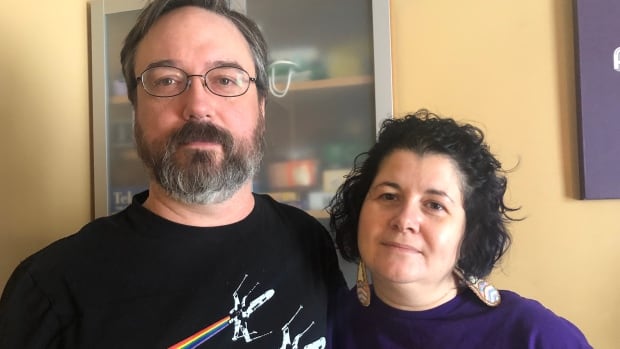
Parents of transgender children in the Northwest Territories say they are worried policy changes in Alberta will impact their kids’ access to gender-affirming care.
The Northwest Territories Health and Social Services Authority is responsible for providing health care for transgender, non-binary and gender nonconforming children and youth in the territory. However, most of its health care professionals have limited expertise in transgender health, so patients are often referred to specialists in Alberta.
In an announcement last week, Alberta Premier Danielle Smith said her government will ban puberty blockers and hormone therapy for all children 15 and under, and require parental consent for 16-and 17-year-olds who want access to those therapies.
Smith told reporters last Thursday that her government will begin implementing those policies — along with other restrictions on how gender identity is expressed in schools, sporting competitions and sex education — in the fall.
Long wait lists
Yellowknife resident Amanda St. Denis has two transgender kids, aged 9 and 12. St. Denis said she had a “visceral” reaction to the Alberta announcement.
“It’s stressful — not only the uncertainty about what health care is going to look like, but the uncertainty about trans rights,” St. Denis said.
Her daughter, 12, is scheduled for an appointment with gender-affirming care specialists in Edmonton next month, to get more information on puberty blockers and other supports available.
St. Denis said she contacted the Northwest Territories Health and Social Services Authority soon after Smith announced Alberta’s new polices, but as of Sunday afternoon, she still hadn’t gotten confirmation that she could go ahead with the appointment as planned.
“The wait lists are years long. This is our first appointment after being referred years ago. So if we have to be transferred to another clinic, what does that mean? Do we have to wait longer to see a specialist?” she said.

Northern Mosaic Network executive director Chelsea Thacker said many other families in the territory are facing the same uncertainty. They said the day after Smith announced the new restrictions in Alberta, about 10 families reached out to them for answers and support.
“There is a direct concern for any minors receiving [gender-affirming] care,” they said.
“Any referral directly goes to Alberta services. So if they no longer decide that they are going to provide care, even to N.W.T. residents, then we will see a wipe-out of services that are available to families.”
No answers yet
The Northwest Territories Health and Social Services Authority was not able to respond to questions from CBC about how restrictions on gender-affirming care in Alberta might impact youth in N.W.T.
In an emailed response Friday afternoon, spokesperson Krystal Pidborochynski said the health authority was “just learning” about the changes in Alberta gender policy, and said the health authority was working to “assess the impact this may have on access to gender-affirming care for Northwest Territories residents.”
CBC North also reached out to the office of Alberta’s health minister to ask if the coming restrictions on access to hormone therapy and puberty blockers will apply to youth on medical travel from the N.W.T.
In response, a spokesperson told CBC that Alberta will “engage with stakeholders, including our counterparts in the Northwest Territories, to determine exactly how these policies will be implemented.”
Despite the uncertainty, St. Denis said she is committed to making sure her daughter gets a gender-affirming care plan.
“Getting at answers initially is our priority, and then just going one step at a time to see what happens and deal with it as it comes,” she said.



